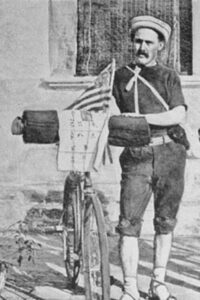
Across Asia on a Bicycle
The day after we were graduated at Washington University, St. Louis, Mo., we left for New York. Then, we sailed for Liverpool on June 23, 1890. Just three years afterward, lacking twenty days, we rolled into New York on our wheels, having “put a girdle round the earth.”
Our bicycling experience began in Liverpool. After following many of the beaten lines of travel in the British Isles we arrived in London, where we formed our plans for traveling across Europe, Asia, and America. The most dangerous regions to be traversed in such a journey, we were told, were western China, the Desert of Gobi, and central China. Never since the days of Marco Polo had a European traveler succeeded in crossing the Chinese empire from the west to Peking.
Crossing the Channel, we rode through Normandy to Paris, across the lowlands of western France to Bordeaux, eastward over the Lesser Alps to Marseilles, and along the Riviera into Italy. After visiting every important city on the peninsula, we left Italy at Brindisi on the last day of 1890 for Corfu, in Greece. Thence we traveled to Patras, [pg xii]proceeding along the Corinthian Gulf to Athens, where we passed the winter. We went to Constantinople by vessel in the spring, crossed the Bosporus in April, and began the long journey described in the following pages. When we had finally completed our travels in the Flowery Kingdom, we sailed from Shanghai to Japan. Thence we voyaged to San Francisco, where we arrived on Christmas night, 1892. Three weeks later we resumed our bicycles and wheeled by way of Arizona, New Mexico, and Texas to New York.
During all of this journey, we never employed the services of guides or interpreters. We were compelled, therefore, to learn a little of the language of every country through which we passed. Our independence in this regard increased, perhaps, the hardships of the journey, but certainly contributed much toward the object we sought—a close acquaintance with strange peoples.
During our travels, we took more than two thousand five hundred photographs, selections from which are reproduced in the illustrations of this volume.
Read or download Book
William Lewis Sachtleben
William Lewis Sachtleben (March 29, 1866, in Alton, Illinois – December 13, 1953, in Fort Lauderdale, Florida) was a 19th-century American journalist and lecturer who was one of the early globe-circling bicyclists, at one time holding a world record for long-distance bicycling.
He was a graduate of Washington University in St. Louis. His attempt in 1895 to rescue, recover, and achieve justice for fellow cyclist Frank Lenz, who had disappeared in Turkey (then in the Ottoman Empire) at the time of the Hamidian Massacres, was seen as akin to the earlier search for David Livingstone in Africa. He later went on to explore for fortune and entered the business world.
His search
William Sachtleben was sent to Erzurum to investigate the circumstances of Lenz’s disappearance. Sachtleben had completed his bike journey around the world in 1892, along with his friend Thomas Allen. He sailed to Europe in March 1895, and traveled to Erzurum, having to forge papers to gain entrance to Ottoman Kurdistan.
In Erzurum, Sachtleben learned that Lenz had somehow insulted a notorious local Kurdish chief when passing through a small village there. The local Kurds then apparently ambushed and killed him, burying his body on the bank of a river in the forest.
The Kurdish bandit believed to have killed Lenz was charged and convicted by the Ottoman authorities, but later fled. Some of the Armenian locals who had helped Sachtleben uncover Lenz’s fate were also imprisoned, a couple of them dying in prison.
Eventually some eight years after his death, following pressure from the U.S., the Ottoman government agreed to pay a compensation of around $7,500 to Lenz’s mother.






